Building an SEO team that actually delivers results can feel overwhelming. Many businesses struggle to balance technical know-how, content creation, and analytics—often with limited resources or unclear roles.
I've seen companies waste months hiring the wrong specialists or cobbling together mismatched teams, only to fall short of their organic growth goals. The truth is, structuring your SEO team the right way is just as important as the skills you hire for.
In this article, I'll break down what makes an SEO team effective, from the core roles and daily responsibilities to the skills that drive real business impact. You'll get practical models for team structures—whether you're a solo founder, scaling SME, or enterprise leader—and clear advice on hiring, onboarding, and managing performance.
I'll also cover the pros and cons of in-house, agency, and hybrid setups, plus how AI-powered tools like SEOSwarm can help you scale without ballooning your headcount. By the end, you'll have a blueprint for building an SEO team that fits your business and adapts as search evolves.
What is an SEO team?
Definition and purpose of an SEO team
Let’s break it down: an SEO team is a group of specialists focused on getting a website more visible in search engine results. The main aim? Bringing in high-quality organic traffic—that means visitors who find you naturally, not through ads.
Unlike advertising departments that drive traffic with paid campaigns, SEO teams go deeper into technical optimisation, algorithm know-how, and sharp keyword strategies. Their expertise sits apart from broader digital marketing, demanding technical and analytical specialisation.
Today, SEO isn’t just another marketing task. It’s a highly specialised role. Solving the puzzles of search algorithms or sorting out technical details like site structure, structured data, and crawlability—these are the domain of experts rather than generalist marketers.
So why invest in a separate SEO team? Climbing the search rankings is only part of the picture. An SEO team ensures those gains turn into lead generation, revenue growth, and stronger brand authority by making your content more discoverable and trustworthy.
To demonstrate tangible business outcomes, it is essential to track visitor behavior across devices and marketing channels, providing a holistic view of the customer journey and its impact on lead generation.
How companies build SEO teams depends on their size and goals. Some create in-house squads, others connect remote experts, and many blend their own staff with agencies. There are even businesses that outsource SEO entirely. It all comes down to resources and strategic priorities.
Key activities and objectives
What do SEO teams focus on daily?
- Technical optimisation
Enhance site speed, architecture, and mobile usability so search engines can index everything accurately. - Content development
Research keywords, produce tailored content, and refresh pages to match evolving search intent and competition. - Outreach and authority building
Grab high-quality backlinks and build partnerships to strengthen search trust and domain authority. - Performance analysis
Track rankings, organic traffic, and user engagement using platforms like Google Analytics and Search Console. - Reporting and strategy adaptation
Regularly update stakeholders, then adapt tactics as analytics, algorithms, and user behaviour shift.
By combining these roles, a strong SEO team becomes your strategic growth engine—making sure organic visibility keeps pace with both business objectives and an ever-changing search landscape.
SEO team structures: Models and organisation
Common team setups by company size and maturity
Structuring your SEO team really hinges on how big your company is and where it sits on its growth path. The central ingredients—strategy, technical optimisation, content, outreach, and analytics—never change, but the way you organise them absolutely does.
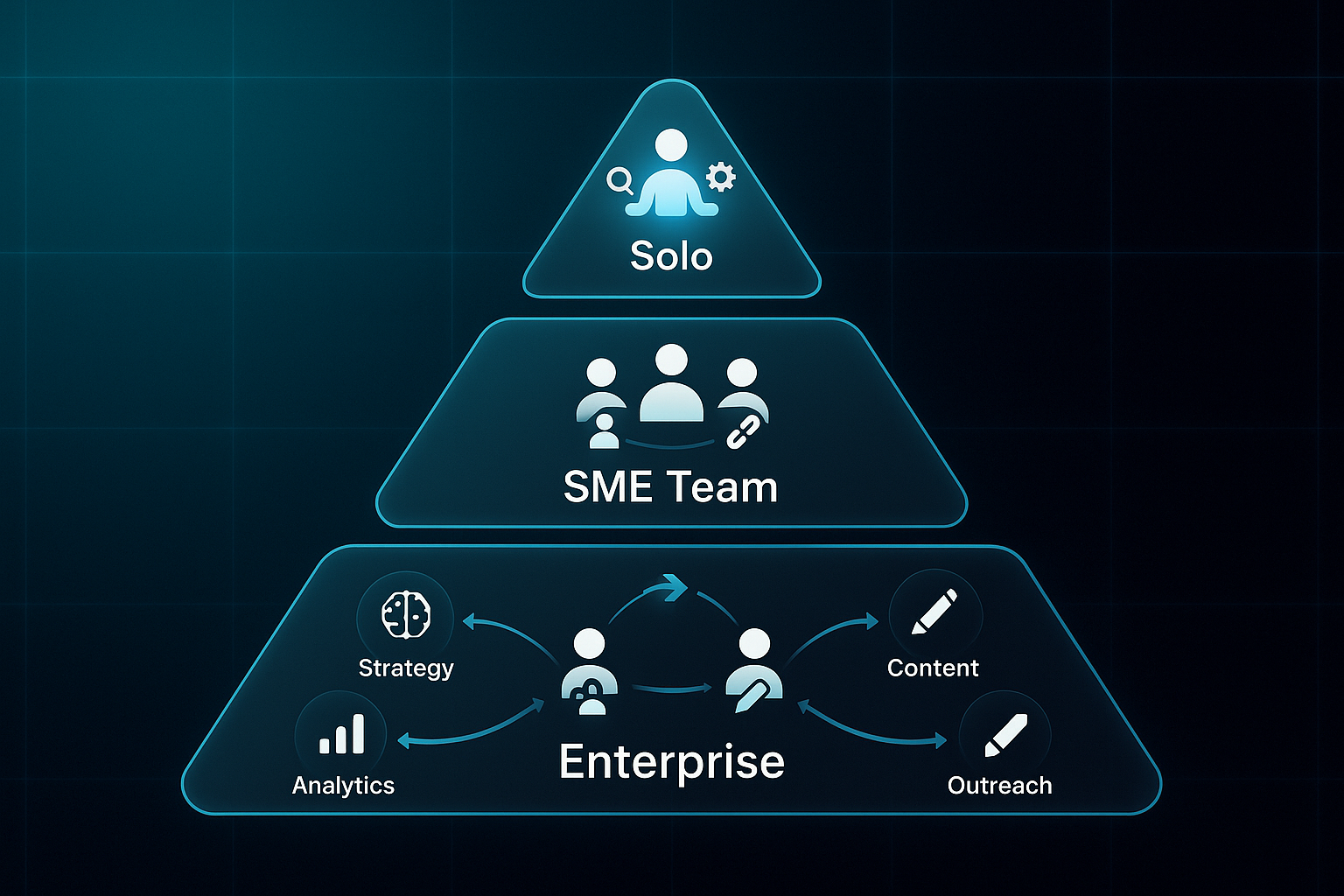
Solo practitioner/team-of-one (e.g., start-ups)
In most start-ups, one overworked expert has to juggle the lot: strategy, keyword research, content writing, technical tweaks, analytics, and outreach. Tools like Screaming Frog or Semrush become vital for quick audits and reports. But when technical fixes get tricky, bringing in a freelancer is pretty standard.
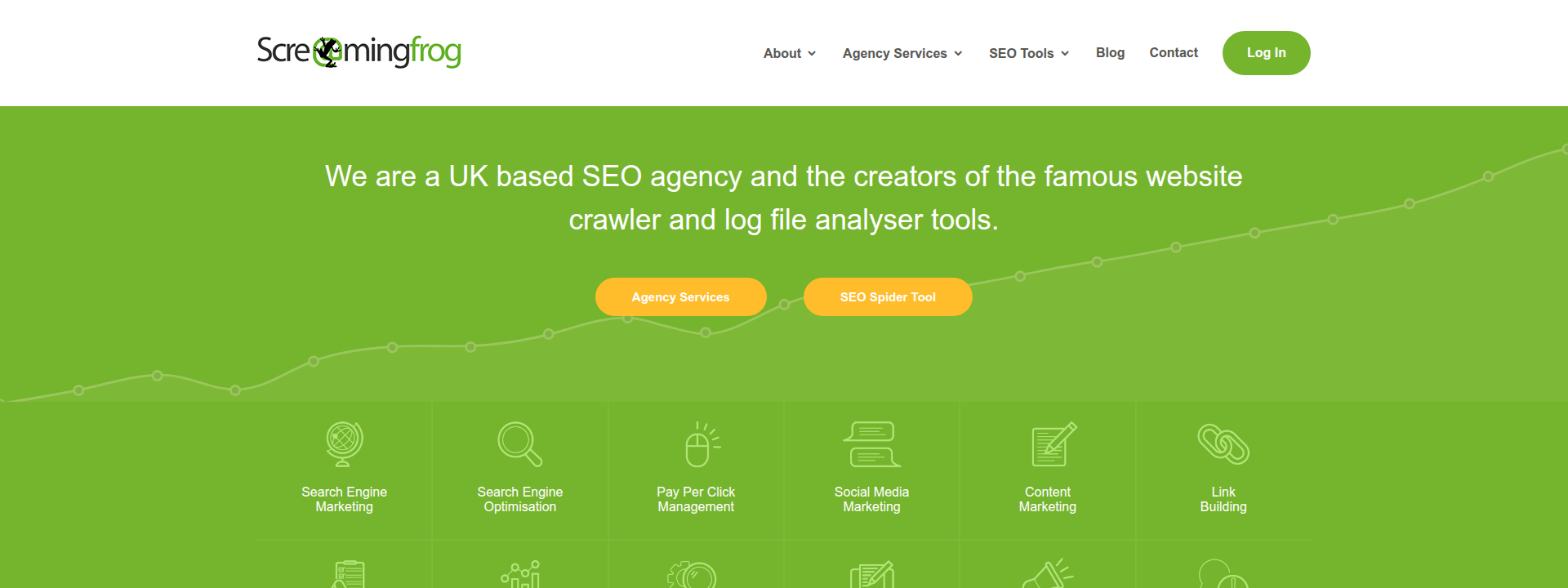
Source: screamingfrog.co.uk
With just one person running the show, the focus stays on maintaining site health and chasing after easy, high-impact keyword wins. Naturally, limited time and skillset make scaling hard. Growth, more web pages, or heavier workloads will usually be the push to expand.
Small-to-mid-sized SEO teams (SMEs)
As businesses grow, teams typically stretch to three to five people. The line-up? A head of SEO, content lead, writer or editor, outreach specialist, and some technical support. Roles blur—people tackle several jobs, and extra freelancers fill gaps.
Trello, Slack, or Asana become essential, helping everyone coordinate and stay in sync. This setup brings more expertise, but spreading skills across a growing task list is still tricky. When content or technical work balloons, further specialisation naturally follows.
Enterprise-scale SEO teams
Now, in larger enterprises, things become multi-layered. Teams split by product, region, or area of expertise. Technical leads, analysts, link builders, strategists, editorial and IT all get a seat at the table.

With remote or global setups, tools like Jira or Monday.com keep projects flowing. Big teams face new headaches—communication tangles, risk of silos, and a constant challenge to stay agile. Often, companies scale up this far as they enter fresh markets or grow brand portfolios.
However big you get, evolving your team is always about one thing: achieving scalability, breadth of skills, and lasting SEO results as the digital space gets more complex.
According to our research, 57% of enterprise SEO teams are made up of two to five people.
Key roles and responsibilities within an SEO team
Essential roles for effective SEO execution
Behind every successful SEO team, you’ll usually find specialists, each focused on a particular slice of the search optimisation pie. These roles are the building blocks—some you’ll see in every setup, and others appear as your business and ambitions grow.
- SEO Strategist
Sets the overall direction, links SEO work to company goals, chooses KPIs, and revamps strategy when algorithms or markets shift. - Technical SEO Specialist
Manages site audits, speed, crawlability, and structured data, coordinating with developers on fixes and migrations. - SEO Content Writer/Editor
Handles keyword research, optimises content, keeps editorial quality high, and uses AI tools for efficient production. - Link Builder/Digital PR Specialist
Focuses outreach, acquires backlinks, and lands placements in key publications to strengthen ranking and domain authority. - SEO Analyst/Data Specialist
Monitors keyword positions, traffic, and behaviour, creates dashboards, analyses conversion and ROI, and tracks algorithm impacts.
Supporting roles and flexible responsibilities
Now, what happens as projects pile up or your team expands? That’s when you pull in the supporting cast—experts who bridge gaps, improve user experience, or tackle local challenges.
Medium or large teams often fill these roles via hiring, contracts, agencies, or freelancers.
- Project Manager
Orchestrates projects and deadlines, keeping everything coordinated against strategic aims. - UX/CRO Specialist
Sharpens user journeys and raises conversion rates for organic visitors. - Local/International SEO Specialist
Adjusts SEO plans for geography, languages, or regulations. - Developer Support
Puts technical SEO recommendations onto the site and handles ongoing changes.
How roles adapt based on team size, resources, and business context
Smaller teams wear several hats—sometimes one person covers strategy, content, technical, and analysis alone. That’s why agency partnerships or freelance support are so popular in these setups; they fill skill gaps you just can’t cover in-house.
As your company scales, roles narrow and sub-teams emerge—a dedicated group for audits, one for content, others for outreach and analysis. Enterprises often split teams by product lines or markets, coordinated yet specialised.
Here’s the twist: hybrid strategies are reshaping things, particularly through platforms like SEOSwarm. By fusing agency-level expertise and AI-powered research, businesses can scale and improve content without ballooning their headcount.
So, greater capacity and quality output become realistic, even for lean teams.
In the end, who does what in your team really decides how far and fast you’ll scale. It’s about blending the right talent—internal, external, or hybrid—to match your ambitions and navigate the ever-shifting world of SEO.

AI-Powered
SEO Content Strategy
See the AI platform that's replacing entire content teams
(with better results).

Essential skills every SEO team needs
Technical, content, and analytical skills
To build a genuinely effective SEO team, three main skill sets are essential: technical expertise, creative content abilities, and keen analytical thinking. Together, these shape organic growth in an ever-changing digital landscape.
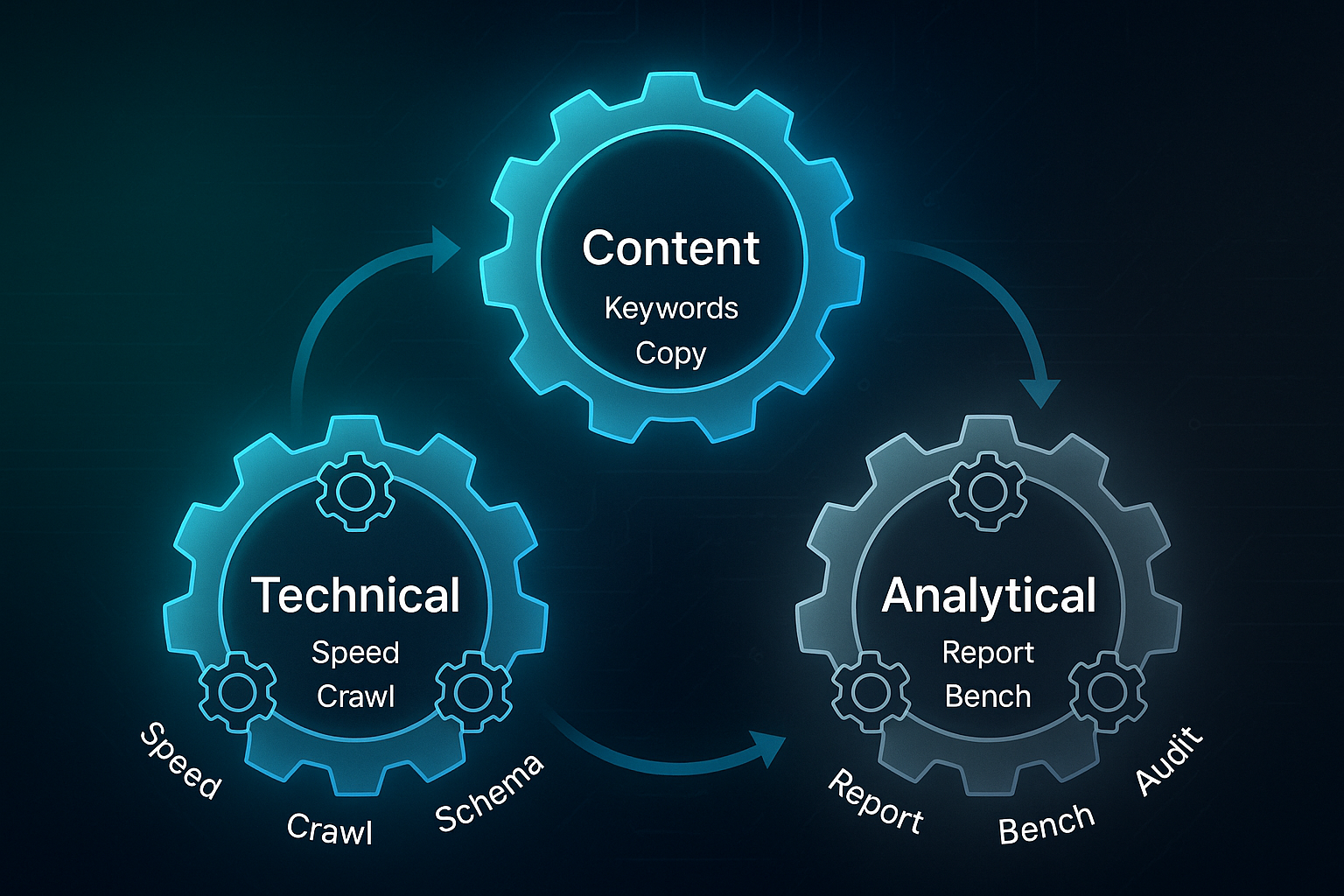
Every great team starts with command of key tools like Google Analytics, Search Console, SEMrush, Ahrefs, and Screaming Frog. These platforms are non-negotiable for thorough audits, tracking keywords, and staying competitive.
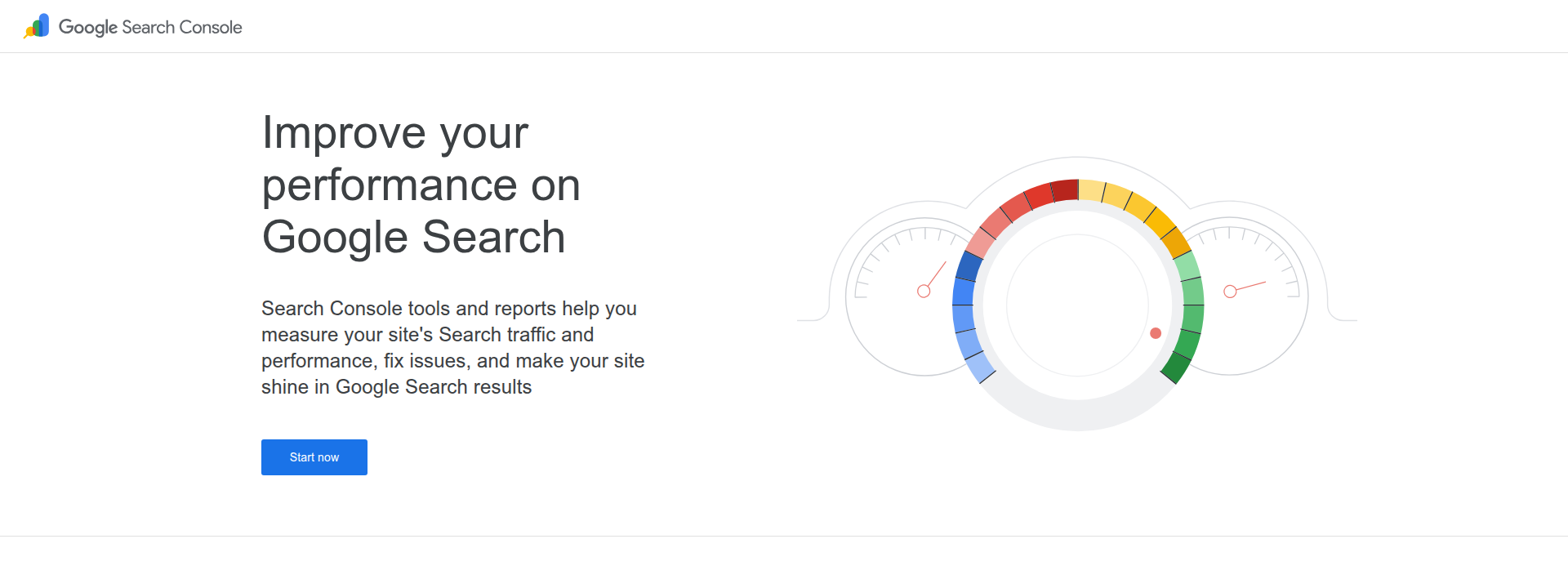
Source: search.google.com
But it’s not just about knowing the tools. You need people fluent in site performance optimisation, from streamlining site speed and mobile use to ensuring code is shipshape. Structuring data with schema markup helps secure that all-important search visibility.
Troubleshooting is constant—crawling and indexing issues often call for HTML, JavaScript, and a bit of backend know-how.
Content skills are just as crucial. Advanced keyword research isn’t simply a box to tick; it’s about truly understanding what your audience seeks and tailoring content for search intent. Your team needs to build topical authority and align with Google’s EEAT guidelines.
Copywriting does more than make things readable. It must engage people while also setting you up for stronger rankings, all while keeping pace with shifting search trends.
Measurement underpins it all. Tracking organic traffic, conversions, and keyword rankings keeps progress clear. High-performing teams benchmark against leaders—just look at HubSpot’s SEO group—and keep everyone in the loop with concise dashboards.

HubSpot Reports & Dashboards Tutorial (2024)
SEO never stands still. Teams increasingly need AI-driven research and new, privacy-first tools like GA4 as expectations expand beyond classic channels.

GA4 for SEO: 5 Reports for Organic Traffic and Lead Generation
Collaboration and communication competencies
And here’s the thing—no team becomes truly effective without seamless collaboration.
Open briefs and regular check-ins keep projects moving and snags to a minimum.
Adaptability and communication set standout teams apart, letting them align their SEO efforts with big-picture business goals and respond swiftly when algorithms, or strategies, change.
Leaning into emotional intelligence and proactive teamwork ensures every discipline, from technical to creative, pulls in the same direction.
How to structure your SEO team for business growth
Team configuration by business type and stage
Solo generalist structure—maximising efficiency with limited resources
Imagine running SEO all by yourself. You’re responsible for strategy, technical fixes, content, and analytics—all at once.
Time-blocking helps keep you focused, carving out dedicated slots for deep work like meta tag updates or keyword research. To avoid burning out, solo SEOs batch similar tasks—getting all meta data tweaks done in one go makes everything smoother.
AI tools and automation (Jasper, Frase, Surfer SEO) dramatically speed up your content workflow, while apps like Trello or Notion keep your progress crystal clear. With direct links to decision-makers, you can move fast and adapt as business priorities change.

SME team organisation—prioritising core roles and competencies
As your business grows, so does the SEO team. Now, you have a tight-knit crew: SEO strategist, content lead, and technical support.
Coordinating everyone is made much easier with project boards such as Asana or Monday.com—progress is visible, and tasks are never dropped. Regular reviews (editorial or technical) ensure a consistently high quality of work.
Hybrid and remote working are the norm, so platforms like Slack or Microsoft Teams let people easily chip in and share feedback. These cloud-based tools keep teams connected across shifting schedules and locations.
Enterprise team structure—specialisation and collaborative frameworks
At the top end, enterprise SEO teams split into focused groups—technical, content, outreach, analytics—and sometimes align by product or market.
The big challenge? Preventing silos. That’s where cross-pod meetings and central dashboards step in, keeping every group moving in sync. Automation means faster audits and reporting.
Multi-layered approvals involve the SEO Director, Content Lead, and Compliance, keeping everything on-brand and rigorous. Tools like Confluence and Google Workspace support remote and global work, with digital updates and syncs holding it all together.

Building, hiring, and managing your SEO team
Prioritising and hiring for the right roles
Getting your SEO team right means linking each role directly to what your business needs. Facing a website migration? A technical specialist is essential. Focused on building your brand? You’ll want content creators and outreach experts chasing down high-value backlinks.
A competency model makes your hiring focused and avoids overlap. Tie each critical skill—schema markup, technical audits, GA4 know-how—straight to your aims. That way, you cover the bases that truly matter and don’t waste budget or effort.
But hiring mistakes happen. Recruit a technical SEO when you needed a strategist for content, and suddenly you’re missing key results. The right match at the start sets up your team—and your organic performance—for real, lasting growth.
Writing job descriptions and finding talent
Writing job ads isn’t just box-ticking. For start-ups, you want generalists who can cover SEO end to end. Once your team’s bigger, it’s time to bring in specialists like SEO analysts or experienced link builders.
Forget judging on CVs alone. Use practical skill tests—a technical audit, a keyword map, an outreach plan. You’ll spot the real performers immediately and avoid those who can talk the talk but not deliver.
Top talent won’t seek you out by accident. Go after them. The right job boards, LinkedIn ads, and networking at industry meetups all work. Show off your team’s actual wins. Tap niche groups when you need hard-to-find skills or international reach.
Smart onboarding and ongoing team development
Onboarding means more than a quick hello email. Give new joiners access to clear docs, ready-made workflow templates, and a team glossary if you want them productive from day one.
Lay out 30/60/90-day milestones: sort the first audits, master the main platforms, then step into team projects. Solo SEOs stay motivated by racking up early wins. SMEs rely on frequent feedback. Enterprises benefit from structured group learning with other departments.
Staying sharp is non-negotiable. Make time for knowledge shares and mentoring. Hold quarterly skills reviews—these close gaps fast. Regular sessions over Slack or Zoom break silos and keep ideas flowing across remote or hybrid teams.
Managing performance and driving growth
It’s not about tracking numbers for the sake of it. Set SMART KPIs—organic traffic, indexed pages, or conversion rates that prove business impact.
Monthly check-ins and concise reports keep the team on target. If business needs evolve—a sudden algorithm shake-up, maybe—respond fast: retrain internally, bring in new expertise, or get external help.
The fundamental question every search marketing professional must address is not if search will change, but rather, 'How is search changing and how do you react to that change?'
If a start-up faces a big Google update, sometimes hiring a technical SEO quickly is the fix that brings rankings back. That kind of agility ensures your SEO team always stays ahead—no matter how the landscape shifts.
In-house, agency, and hybrid SEO teams: Pros, cons, and modern approaches
Comparison of different team models
Choosing your SEO team setup boils down to three options: in-house, agency, or a hybrid mix. Each one shapes your control, responsiveness, and ability to scale.
- In-house SEO teams
Offer maximum control and easy teamwork, but are expensive to staff and can leave skill gaps if budget is tight. - Agency/outsourced SEO teams
Bring wider expertise for rapid scaling. Drawbacks? Less hands-on control, possible branding gaps, and a need for regular, clear communication. Costs usually start with monthly retainers. - Hybrid structures
Combine in-house strategic guidance with outsourced execution. This approach offers flexibility, letting you scale up or down swiftly, without committing to permanent hires.
For start-ups, using agencies or a hybrid model is often the fastest way forward. SMEs usually keep oversight in-house but seek specialised help outside. Enterprises build big in-house teams, yet still bring in agencies for major projects or scaling needs.
AI-augmented/agency-led workflows for modern SEO
AI is changing the game for every team.
- Role of AI in SEO team efficiency and output
Automates keyword research, content, audits, and reports—freeing staff for strategy. - Blending AI and agency expertise
Platforms like SEOSwarm combine automation with expert guidance, giving you quality at speed—minus the bloated team. - Cost and accessibility benefits
SEOSwarm’s automated publishing, schema, and internal linking deliver enterprise-grade features to all business sizes. Their “blog-in-one-minute” makes content live fast. - Business use cases and performance gains
AI-powered, agency-supported models let brands publish more, spend less, and maintain a strategy-first approach.

Modern team models make SEO scalable, cost-efficient, and adaptable, so you sidestep hiring headaches and stay ready for whatever comes next.
Solving common SEO team challenges
Role clarity and hiring uncertainty
Ever wondered who’s really in charge of technical fixes or content updates? When those lines go fuzzy, teams trip over each other or things simply get missed—especially in fast-growing businesses or SaaS environments.
HubSpot felt this pain and solved it by mapping out clear duties for each role, then checking quarterly that the lines still made sense. The trick? Spot what’s missing—maybe analytics skills or a technical hand—and connect those needs to defined roles.
When you’re just starting out, a generalist is brilliant. As the team scales up, you’ll need specialists or agency backup. That’s the beauty of hybrid teams: you get in-house oversight plus scalable support without the hiring hassle.
- Maintain clear documentation
Spell out each role and update job specs as priorities shift. - Quarterly audits
Review assignments to make sure strategy and execution still align. - Flexible resource planning
Move smoothly between in-house and outsourced talent to meet changing demands.
Once your roles are clear, resource bottlenecks are the next big hurdle.
Scaling, resource limitations, and workflow bottlenecks
Thin budgets and sudden workload spikes can stall even the best SEO teams. Expedia saw this firsthand when global technical audits slowed everything down.
The fix? Automate the repetitive bits with AI, and tap agencies for extra firepower when workloads jump. SEOSwarm’s agency/AI set-up gives lean teams the power to scale content and audits—no permanent hires required.
- Automate repetitive work
Let AI handle routine audits and initial content. - Tap external support
Bring in agencies or freelancers for overflow or specialist work. - Centralise workflows
Run everything from a shared system to avoid bottlenecks.
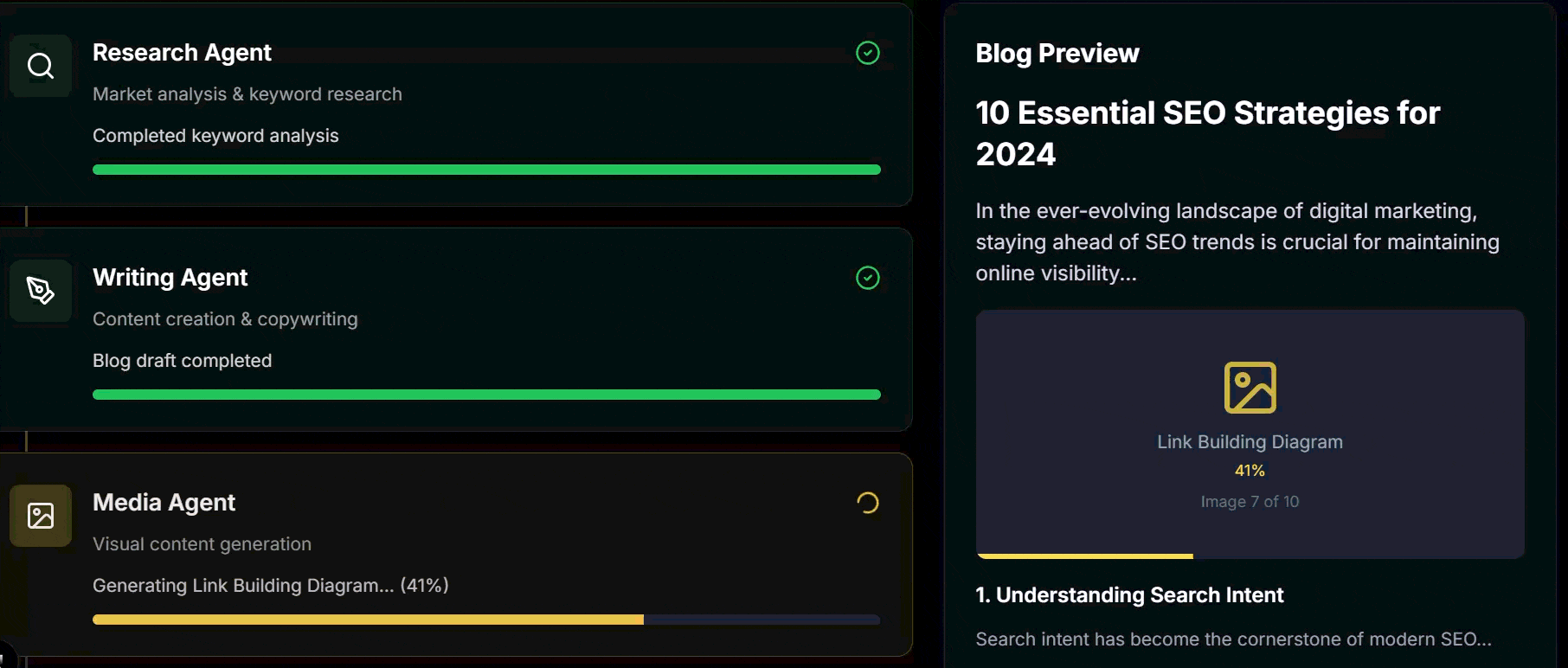
That’s how nimble SEO teams keep pace—and stay in step with business strategy.
Blog-in-one-minute
Add a fully SEO-optimised blog to your website with just 2 lines of code.
Learn more
Collaboration and workflow best practices for SEO teams
Great SEO teams rely on close collaboration and streamlined workflows. When SEO sits alongside development, content, and PR, duplication drops and communication gets clearer, so strategic goals become much easier to reach.
Internal and cross-departmental collaboration
Going it alone rarely works. Missed keyword opportunities or delayed site changes can set you back. The best teams put clear touchpoints in place between departments so joint planning and coordinated outreach happen as standard.
- Unified project boards
Jira or Trello keep SEO, development, and content tasks organised and visible. - Central documentation
Notion or Google Docs store workflows, briefs, and protocols everyone can access. - Regular collaboration routines
Monthly meetings or bi-weekly check-ins track KPIs and project momentum. - Shared KPIs and feedback loops
Aligning goals—like organic traffic—drives real impact and accountability.
SMEs often use weekly Slack updates for quick communication, while enterprises favour sprint cycles and layered approvals. Skip these routines and vital SEO tweaks after a site launch may be missed, harming your rankings.
Continuous improvement and adapting to change
Regular feedback, skill sharing, and cross-training—think writers learning schema markup—keep teams agile. Piloting new tools like GA4 or SEOSwarm works best with documented workflows. Frequent retrospectives help teams adapt quickly, sidestep bottlenecks, and safeguard those organic results.
Building a Strong SEO Team Together
Every effective SEO team starts with a simple truth: structure matters as much as skill. The right mix of roles, clear responsibilities, and smart use of technology will always outperform a scattered approach—no matter your company size.
Here’s what I recommend: map your current needs, then decide if you need a solo generalist, a tight-knit SME crew, or a specialised enterprise team. Don’t hesitate to blend in agency or AI support when gaps appear. Use practical skill tests in hiring, document every role, and revisit your structure quarterly to keep pace with shifting business goals and search trends.
SEO teams should never stand still. The most successful ones adapt, automate, and collaborate relentlessly. Build for flexibility now, and you’ll be ready for whatever Google throws your way next.
- Wil







